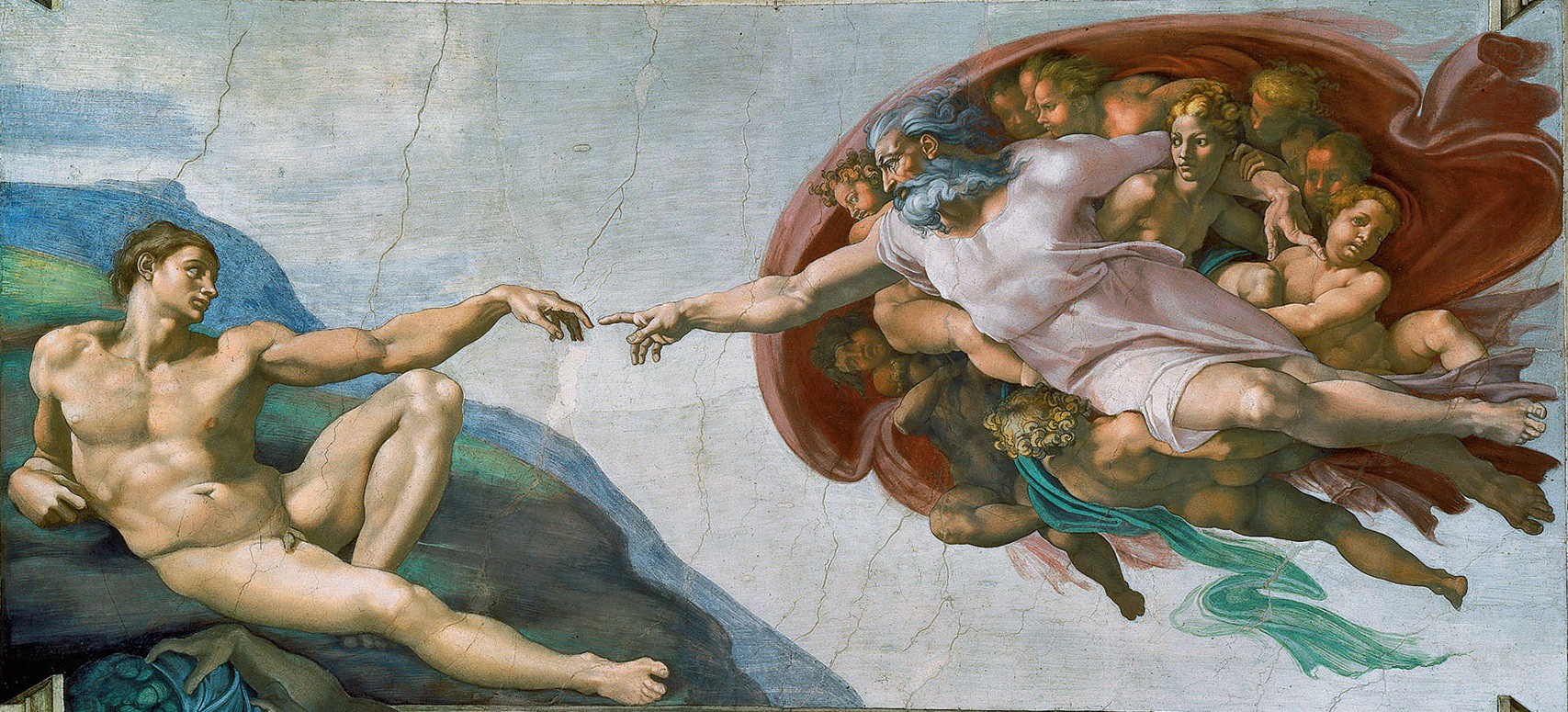Anytime God interacts with creation he must condescend. This isn’t in an insulting way, rather it is always done in love. Like a loving parent stooping down to a child’s eye level.
Psalm 40 says
“I waited patiently for the LORD
He inclined and heard my cry”
Some translations even use the phrase “stooped down” instead of “inclined”.
There is no other way for us to relate to God, unless he condescends to our level where we can begin to understand him.
Years ago I heard my Pastor, use the phrase “God meets us in our myths.” I was captivated by that phrase and reflected on it for years before I started to fully understand it.
Since we cannot meet God on his perfect level, it means that God must communicate to us in imperfect ways. Just being boxed into human language is an enormous limitation for an infinite being. On top of the language barrier we are all limited by our context and experiences.
Imagine trying to explain generosity to an ant by telling the plot of Charles Dickens’ A Christmas Carol.
“The story is about a very rich ant named Ebenezer Scrooge…”
(Let’s assume the ant can talk).
“What’s a story?” asks the ant.
“Well it’s when we tell someone about something that happened” you might say.
“So this story is about something that happened to you?” the ant asks.
“Well, no this a fictional story, so it didn’t really happen at all.” You reply.
“Then why do you tell a story that didn’t really happen?”
“Don’t worry about that part for now, it will make more sense after you hear it. So there was a very rich ant named Ebenezer Scrooge…”
“What is ‘rich’?” asks the ant.
“It means he had a lot of money.”
“What is money? asks the ant.
“Uhh, don’t worry about money. It just means he owned a lot of things, more than the other ants around him.” Thankfully you are a very patient story teller and you go ahead to explain ownership and how he owned more food and had a much bigger tunnel than all the other ants.
But now the ant is confused, “how could one ant own more than any other ant? It all belongs to the colony and the queen is over the colony.”
You now imagine having to explain Christmas next and give up on the story all together.
In this case, it isn’t that this ant isn’t smart enough to understand, it just doesn’t have the context and experience. If the ants continue to progress beyond just learning to talk, maybe someday they will be ready to hear the story of how the hard-hearted and selfish Scrooge was visited by three ghosts on Christmas Eve and how he learned to be generous.
It might take generations before they can begin to understand the story, but when they do, maybe they will see their colony as Scrooge and the story will help the ants to be more generous with other ant colonies. Or maybe the story would be more subversive and expose the ant queen for exploiting her workers as slave labor.
Which is an interesting aside on how a story could mean different things to different cultures and at different times.
Isaac Newton said “If I have seen further it is by standing on the shoulders of Giants.” Attributing his new understandings that will revolutionize the world as being built on the foundations of the great thinkers that came before him.
So when God first spoke to Abram (Abraham) He didn’t start with the sermon on the mount. He didn’t teach Abraham to turn the other cheek, not to lust in his heart, or to give in secret. No, he told Abraham to come out of the pagan world he was living in and into a new land under the one true creator God.
First he had to lay the foundation with Abraham that he was God. Abraham didn’t have the law, he didn’t even know God’s name. Hundreds of years later, God revealed his name to Moses, then he gave the Israelites the law.
Because we stand on the shoulders of giants and can hold the entire 1500 to 2000 year history from Abraham to Jesus in our hand it is easy to forget that they didn’t know everything that we know now.
For example, there are certainly hints all throughout the Old Testament of a coming Messiah that are easy to see in retrospect, but we don’t start to get a clearer view of Jesus until the prophets like Isaiah who arrive at the end of the Northern Kingdom as they are getting destroyed by Assyria.
Even then the Messiah as a suffering servant wasn’t understood by the disciples themselves until after Jesus’ resurrection when he explained it to them.
So God condescends to meet ants, I mean humanity, where they are at and progressively leads them to where he wants them to be. Revelation isn’t instantaneous, it is a slow peeling back. And this slow progressive revelation is evident in how God relates to us in scripture through history. The image of God becomes more and more clear as the curtain is pulled back and light is let through.
First he is the God of Abraham, Issac, and Jacob, but that may not be to the exclusion of other gods still existing, because they only understood gods as being tribal and regional.
Then God is the one true all-powerful God.
Then God is the ONLY God.
Then God is revealed in Jesus.
Then Jesus is revealed as Lord of all people, not just the Jews.
But in each stage God must relate or condescend to the understanding that his people are ready to see.
Sometimes this condescension means that God must settle on something that is only good, rather than the best, or even just better than bad, rather than the perfect.
For example, Moses gave the Israelites divorce because of the hardness of their hearts. Samuel gave them a king because of the hardness of their hearts
So we have two Biblical examples of God giving humans something not because it was good but because of the hardness of their hearts it was the best they were ready for, first with divorce then with a monarchy, and these were better than the alternatives, such has hard hearted men staying with women they didn’t want to be married to and abusing them and Israel creating their own monarchy apart from God in the image of the nations around them.
Now I ask are there things that are not explicitly taught in the Bible that we would consider to be true now?
What about slavery? Slavery was never expressly condemned in the Bible, but all modern Christians would condemn it by stating that slavery is against the heart of the Gospel. In other words, Jesus and the teachings of the apostles, pointed us in a certain direction to respect the dignity and humanity of all people and one person owning another like property did not fit the spirit of Jesus’ life and teaching.
While there were many brothers and sisters over the last 2000 years who abhorred and strongly condemned slavery, it took around 1900 years for the church universal to reach a unanimous condemnation of owning other humans in a way that it will probably never go back on.
Not only was slavery never clearly condemend, but it was even condoned in the Old Testament law. Why did God give the Israelites rules on slavery? Was it because he wanted them to have slaves or that he was indifferent to it?
I think most of us would agree that slavery was not part of God’s perfect plan for his people. The problem was that ancient peoples had slaves. Rather than turn their entire world view upside down, God wanted to teach them to focus on worshiping him and in doing that they would learn that God is love and owning other humans is not acting in love, therefore not Godly. So instead Moses gave them humane laws, boundaries and limits on how to treat slaves, and he gave them laws to prevent intergenerational slavery, like with the year of Jubilee.
It seems safe to say that God gave the ancient Israelites laws on owning slaves not because he condoned it, but because of the hardness of their hearts and to protect slaves at the same time.
In other words, God condescended to meet them where they were at.
Here are a few more explicit examples of how God condescended in the past, but then provided a better way in Jesus.
The law said that justice should match the crime, eye for an eye, Jesus said to turn the other cheek.
The law said love your neighbor, Jesus said to love your enemy and pray for those who persecute you.
The law said to not commit adultery, Jesus said that lusting in your heart is committing adultery in your heart.
The law said to not commit murder, Jesus said that even being angry with someone else or calling them a name is as bad.
Why didn’t the law go all the way and match Jesus’ later teaching from the very beginning? Or for that matter, why didn’t Jesus or Paul come right out and condemn slavery? Why did God have to condescend?
To answer those questions, we have to look at the law and Jesus and Paul in their context. The ancient near east was a violent place and the strong always ruled over the weaker and the world wasn’t ready to invert everything like Jesus did, saying that in the Kingdom of Heaven the first shall be last and the last shall be first, or that the weak are blessed, and then ultimately sacrificing himself on a cross, although there are many hints of it scattered throughout the Old Testament.
Progress must always be made in stages. Just as Caperneus made the world ready for Galileo, who made the world ready for Newton, who made the world ready for Einstein. So Abraham made the world ready for Moses, and Moses the Judges, and the Judges David, and David the prophets, and the prophets Jesus.
Brian Mclaren gives the example of a 2nd grade math textbook telling students that you can’t subtract from more than you have, you can’t have less than zero. So 2nd graders go on thinking it is impossible to take away 5 from 4. And this is right for a 2nd grader. By 7th grade these students are ready to think more abstractly so they learn about negative numbers and that you can subtract more than you have. This didn’t make the 2nd grade textbook wrong, it was just right for what the students were ready to learn.
Just like in educating children you have to lay foundations and then build on that before addressing advanced math, so culture has to build on previous foundations.
First lay the foundation of who God is. Then God is one, then God created all things, and there is only ONE God, God is holy, God is just, God is merciful, God redeems and heals, God desires salvation for his people, for all people, and finally for all creation.
Each step brings us closer to who God is revealed in Jesus.
This raises the question, in what other ways did God condescend and make concessions for the hard heartedness of his people?
Consider the Israelites after escaping slavery in Egypt and coming to Mount Sinai. Moses has just led them in a very dramatic exodus from slavery and pursuit through the Red Sea. God calls him up to the mountain that is covered in smoke and lightning. While he is there God gives Moses the Ten Commandments, but these commandments seemingly aren’t enough, God goes on to give Moses instruction on sacred religious practices of worship and sacrifice.
To modern people these practices seem very alien, but it’s vital to understand that to the Israelites these practices were not only very familiar, but normal, even desirable, they were like the pagan rituals and ceremonies in Egypt and everywhere else, except these new rituals focused on the God of Israel.
If you think that is crazy, think of what the Israelites were doing while God is giving Moses the Ten Commandments. They are creating and worshiping a golden calf. It’s as if to prove that they CANNOT live by just these 10 simple commands, they need ritual, they need sacrifice, they need direction to focus their worship, they need detailed laws.
So does God need blood sacrifices to appease him just like all the pagan Gods? Or is it possible that God gave them a way to worship him using the language that they already understood?
Many would say yes, “scripture says that without the shedding of blood there is no forgiveness of sins”, right?
Scripture says that life is in the blood. The blood from sacrifice was sprinkled on the mercy seat to represent the Israelites giving of their lives to God and his mercy. Hebrews 9:22, is quoting the Levitical law actually talking about initiating a new covenant, as was first done with the Ark of the Covenant in the Tabernacle, and the author of Hebrews is saying that Jesus initiated a new covenant. (Read a better explanation here)
Also, the Greek doesn’t actually say “there is no forgiveness of sins” it says “there is no aphesis” The Greek word aphesis is more closely related to “deliverance” or “release”, like the Israelites being delivered from bondage in Egypt.
Rather than God being bloodthirsty for sacrifices to appease his wrath, the Old Testament is filled with God saying that he does not need animal sacrifices. He requires mercy, NOT sacrifice, and Jesus even reiterates this to the pharisees. He tells them to go and learn what that means.
In Ps. 50: 7-18 and 23 God says he owns all the cattle and birds already and doesn’t need their sacrifices. He says if he were hungry he would not bother to tell them. Instead he desires a sacrifice of praise and thanksgiving, that is the sacrifice that is pleasing to him.
In Ps. 51: 16-17 David says that God doesn’t delight in burnt offerings, but rather a broken spirit and contrite heart.
In Heb. 10:5 Christ says that God did not desire a sacrifice and offering but that God prepared a body for him, in other words God wanted his life.
In Jer. 7:21-24 God tells them to take their sacrifices and eat them themselves. He says “When I led your ancestors out of Egypt, it was not burnt offerings and sacrifices I wanted from them. This is what I told them: ‘Obey me and I will be your God, and you will be my people…’” Many translations add the word “just”, as in, “it was not just burnt offerings and sacrifices I wanted” But the word “just” is NOT in the Hebrew and adding it changes the meaning.
Jesus quoted the prophet Hosea (6:6) saying
But go and learn what this means: ‘I desire mercy, not sacrifice.’ For I have not come to call the righteous, but sinners.”
Matthew 9:13
If only you had known the meaning of ‘I desire mercy, not sacrifice,’ you would not have condemned the innocent.
Matthew 12:7
Therefore I contend that all the OT law around ritualistic sacrifice was not required by God in order to forgive Israel, but it was God condescending to Israel and subverting the only language of worship that the Israelites understood.
Yes, the OT scripture points to Jesus, but Jesus also reveals the truth of the Old Testament. All scripture should be interpreted through the clearest revelation and lens that we have and that is the life, teaching, death, and resurrection of Jesus.
Jesus interprets scripture not the other way around.
Since God does not need blood sacrifice to forgive sins that means that the sacrifices of Moses were for the people, NOT for God. Humans need sacrifice to relate to God.
The revelation of Christ is not that God killed his son as a sacrifice to appease his own wrath! Heaven forbid, that is a purely pagan way of thinking and abhorrent to God on multiple levels.
No, the revelation of Christ is that God is always forgiving. In fact God is never not forgiving.
But wait, didn’t Jesus die on the cross for the forgiveness of sins?
Did he? If Jesus had to die on the cross to forgive sins, then why did he go around throughout his ministry forgiving people all over the place? And here is the real kicker, none of them asked for forgiveness, but Jesus gave it away freely. Sure they asked for healing, but Jesus was always taking it one step further and forgiving them too, sometimes even before healing them and then using the healing to prove that they were forgiven.
Then why did Jesus die on the cross? Many books could be filled to try to scratch the surface on answering that, but for the purpose of this writing I will say that Jesus died not to forgive our sins, but to show that our sins are forgiven.
Even when we do our worst and crucify God himself he says “Father forgive them for they know not what they do.”
Once again God condescends, lets us do our worst, then he forgives.



